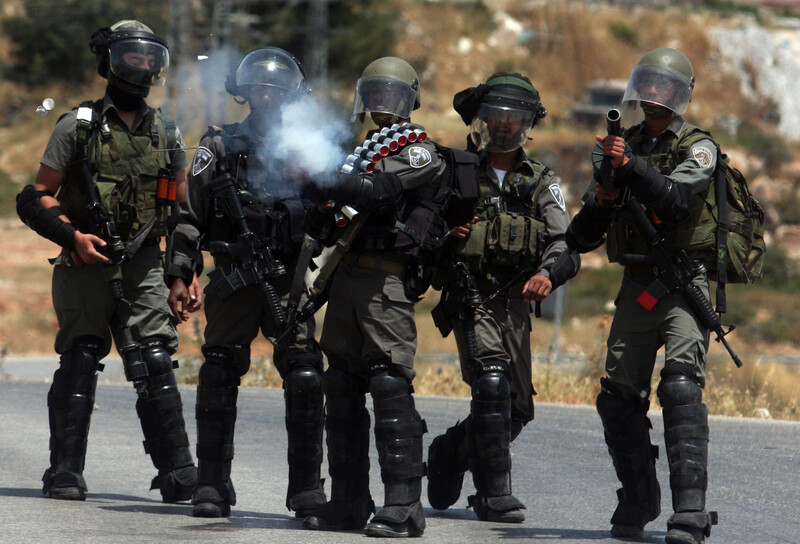Rights and Accountability 30 November 2016

No action is taken against soldiers who violate the Israeli army’s open fire regulations, a human rights group says.
APA imagesIsraeli forces “acted without any justification and did not face lethal danger” when they shot three Palestinians, killing two of them, in separate incidents last month, the human rights group B’Tselem has said.
Two of those shot, one fatally, were children.
Khalid Bahr Ahmad Bahr, 15, was slain on 20 October when he was shot in the back from a distance of approximately 20 meters while running away from soldiers at the entrance to a grove near Route 60 in Beit Ommar, a village in the southern occupied West Bank.
A military inquiry into the incident determined that “the soldiers’ lives were not in danger, and that they could have acted differently in this case,” according to the Tel Aviv newspaper Haaretz.
An Israeli army spokesperson said that the incident is being investigated by the Military Police Investigation Unit, and will then be referred to the Military Advocate General.
30 bullets fired
A day before Khalid Bahr was killed, Israeli forces shot dead Rahiq Shaji Birawi, 19, at the Zaatara intersection near the northern West Bank city of Nablus.
A military inquiry found that Birawi pulled out a knife while approaching the forces and a Border Police combatant shot at her legs, but missed.
“At this stage, and as a video clip published in the media shows, four Border Police officers fired around 30 bullets at Birawi while she was several meters away from them, killing her,” according to B’Tselem.
The Border Police said the incident was still under investigation, Haaretz reported.
“The massive shooting at [Birawi], when she was already lying on the ground and could no longer endanger the Border Police officers, is unjustified and unlawful,” B’Tselem stated.
“This incident joins a list of dozens of cases of extrajudicial executions since October 2015,” the group added. “This policy receives support from both military and government officials, who instruct security forces that terrorists should die.”
The third case investigated by B’Tselem concerns the 15 October shooting of Faris Ziyad Ata Bayid, 15, with a rubber-coated metal bullet during a protest by dozens of youths outside the entrance to Jalazone refugee camp near the West Bank city of Ramallah.
Israeli soldiers used stun grenades, rubber-coated metal bullets and live ammunition to try to disperse the demonstration.
Bayid was among around six youths who had climbed to the base of a nearby hill, “where they hid at a distance of 20-30 meters from the soldiers above them, who fired at them,” according to B’Tselem.
“While Bayid was preparing to throw a Molotov cocktail at the soldiers, and before it had been ignited, the soldiers fired three or four ‘rubber bullets’ and live ammunition toward him,” B’Tselem stated. “One of the ‘rubber bullets’ struck Bayid in the head.”
Shot in head
A 17-year-old boy who was hiding with Bayid told B’Tselem that soldiers “shot a rubber bullet directly down at us. [Bayid] was struck in the upper front of his head.”
“The bullet tore open a hole with a diameter of two or three centimeters,” the witness added. “He began to bleed heavily and fell on his back, totally unconscious and immobile. His eyes flipped over.”
Bayid underwent surgery for his injuries, “but he has not yet regained consciousness and he is still connected to a resuscitation device in the intensive care unit,” B’Tselem stated.
“He’s in a vegetative state and his chances of survival are poor,” Haaretz reported this month.
A military inquiry found that the soldiers were justified in opening fire.
B’Tselem stated, however, that the shooting was “unlawful,” and that the boy “was shot when he was about to throw a Molotov cocktail at the soldiers. The device had not been ignited, and from Bayid’s position at the bottom of the hill he did not pose lethal danger.”
The rights group said that the different “security establishment” responses to the three incidents are identical in terms of the outcome, and will not lead to accountability or change in soldiers’ conduct or prevent such incidents from occurring again in the future.
The group questioned the purpose of open fire regulations issued to soldiers when no action is taken against those who breach them.
Earlier this year, B’Tselem announced that it would no longer cooperate with or refer cases to the Israeli army’s internal investigation unit. The group’s director stated that “We will no longer aid a system that whitewashes investigations and serves as a fig leaf for the occupation.”
Israeli forces have killed 100 Palestinians in the West Bank and Gaza Strip so far this year, 75 of them during attacks and alleged attacks.
Israel has withheld the bodies of more than 130 Palestinians killed during attacks and alleged attacks over the past year, and still holds on to more than 20, including the remains of Birawi and Bahr.






Comments
World watches does nothing
Permalink Sage replied on
No religion would condone such violence against unarmed civilians, especially children. The zionist army have killed unmercifully, and will continue to do so, as long as the world will wring their hands and do nothing, and the US keeps aiding and arming these ruthless killers. It seems American leaders have decided to allow the "only" democracy in the Middle East get rid of all the indigenous Arabs from their territories in whichever form it may take, so that they can colonize the entire area.
If the US really wanted to give the Palestinians their freedom and some type of democracy, it would have stopped aiding and abetting their occupier.